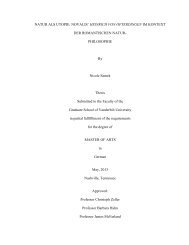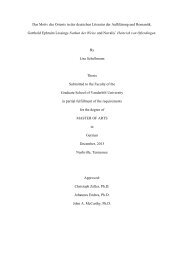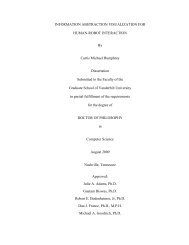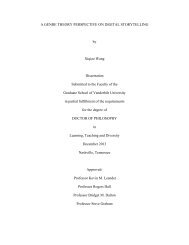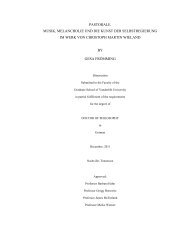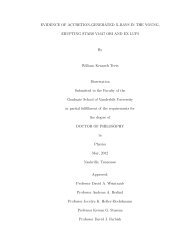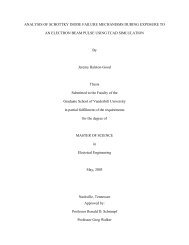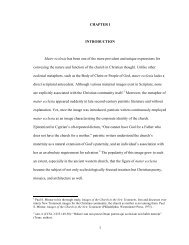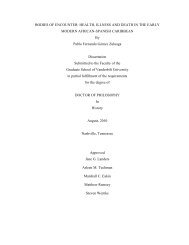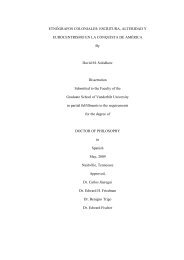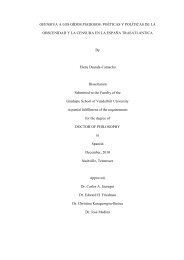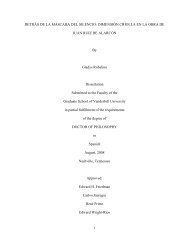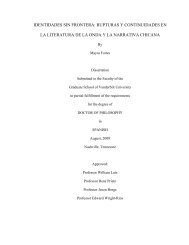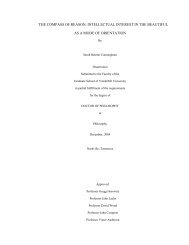THE DEATH OF DIONYSOS - ETD - Vanderbilt University
THE DEATH OF DIONYSOS - ETD - Vanderbilt University
THE DEATH OF DIONYSOS - ETD - Vanderbilt University
You also want an ePaper? Increase the reach of your titles
YUMPU automatically turns print PDFs into web optimized ePapers that Google loves.
place him close to the tragic trajectory of Goethe’s melancholic Werther. Blessin<br />
recognizes the similarities that link the two protagonists but underscores their very<br />
different fates. The difference, he notes, lies partly in Wilhelm’s character: he is “der<br />
durchschnittliche Fall eines jungen Mannes” [“an instance of the average young man”],<br />
whereas Werther had been infected with, and finally succumbed to a virulent germ of<br />
genius (92). But it also lies in the world of the novel and in the author’s intent. Blessin<br />
points out that Die Leiden des jungen Werther had exhibited all the fatalism or, in the<br />
language of the Abbé, the necessity of drama. Wilhelm and Serlo similarly decide that<br />
drama is governed by fate or Schicksal, but then they acknowledge, “daß man dem Zufall<br />
im Roman gar wohl sein Spiel erlauben könne” (308). [“that in the novel Chance might<br />
well be given free play” (EAB 186).] In Book One the Abbé describes chance (Zufall) as<br />
the malleable stuff of life, from which man’s reason can influence the shape to his<br />
existence. Wilhelm himself, however, never realizes such godlike sovereignty in the<br />
novel. So the world of the novel must prepare him.<br />
Blessin analyzes the way that chance and confusion (Verwechslung) make it<br />
possible for Wilhelm to pursue his own ends, even with a mistaken understanding of the<br />
world, and achieve satisfaction, even if the outcome is not in fact what he intended: “Das<br />
Verständnis, das Wilhelm ausbildet und in dem er sich in erster Linie immer selbst<br />
auslegt, mag noch so sehr an den Realitäten vorbeigehen, – es behält seinen eigenen Wert,<br />
büßt nicht an Gewicht und Bedeutung ein” [“Wilhelm’s developing understanding, that is<br />
primarily an interpretation of himself, can be ever so mistaken about reality, – it retains its<br />
own value, lacks neither substance nor meaning”] (102). The world of the novel is<br />
conveniently loose enough in its causal hinges for the hero to arrive at his goal, although<br />
his judgments were mistaken, his choices misguided. This is not to say that what goes up<br />
does not come down; mistakes in the Lehrjahre have their consequences. While he asserts<br />
that no one else shares responsibility for the deaths of Mignon, the Harfner and Aurelie<br />
(“[sie] haben sich ganz von innen aufgezehrt”; “[they] devoured themselves from<br />
within”), Blessin acknowledges Wilhelm’s guilt with regard to Mariane (90). But for<br />
various reasons, the most significant being Werner, Wilhelm does not learn the truth about<br />
her until late in the novel; and by then both external circumstances and changes in<br />
33



